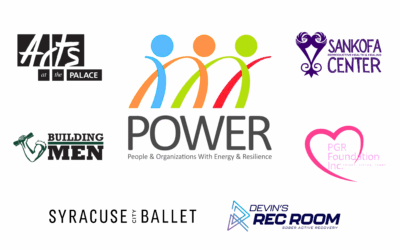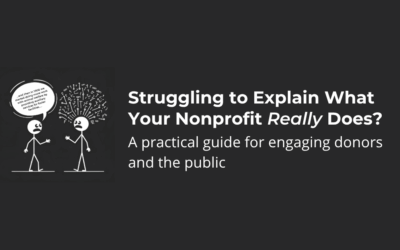Planning Your First Fundraising Event?
A Readiness Checklist for Small Nonprofits

Published June 2024
Fundraising event season in Central New York is upon us. The Upstate climate allows a prime window between May and September for organizations to gather supporters, volunteers, partners, and staff to celebrate their good work and all those who make it possible.
While a fundraising event can be an exciting opportunity for small nonprofits to engage with their community and raise these essential funds, the process can also be complex and requires major time and preparation. Here’s a list of items for your organization to consider before pursuing a major fundraising event along with helpful tips provided by non-profit management consultant Maria Fibiger of Three Dog Consulting.
1. Assess Financial Viability
Can you cover the up-front costs of the event?
Before diving into planning, evaluate your organization’s financial health. Events require initial investments for venue, catering, marketing, and other expenses. Ensure you have the necessary funds or can secure sponsorships to cover these costs without straining your budget.
2. Creating a Plan for Securing Support
Do you have full support from your stakeholders?
A successful event needs the backing of your board and key staff. Confirm that everyone is on board with the idea, understands their roles, and is committed to the event’s success. Their support is crucial for decision-making, securing resources, and ensuring a unified effort.
Consultant tip: Remember that any fundraiser that raises more than $5,000 can be audited and must be approved by a board vote. While an audit is unlikely, you should keep all event-related costs separate from other organization costs so they are easy to track and provide records of.
3. Plan for Staff Time and Resources
Have you estimated the staff time it will take to coordinate and manage the event?
Organizing an event is time-consuming. Calculate the total hours required for planning, promotion, and execution. Ensure your team has the capacity to handle these tasks without neglecting other responsibilities. Consider how much your board and volunteers will be able to help out and whether you need to hire temporary staff or a freelance event manager.
4. Gauge Audience Interest and Attendance
How do you know how much of your audience is going to show up?
Understanding your audience and having the right relationships within your community is key to planning a successful event. Conduct surveys or use past attendance data to estimate how many people might attend. This will help in making informed decisions about the venue size, catering, and other logistics.
Consultant tip: Create a realistic invite list of people who would be likely to attend your event. You should feel confident that you can get 40 percent of that invite list to attend the event. Work on getting pre-commitments from key donors that they can attend on the proposed date and bring their micro-communities with them.
5. Understand Donor Preferences
Do you know what kind of event your donors want to go to?
Tailor your event to your organization’s culture and donor/volunteer community. Are they more inclined to attend a formal gala, a casual picnic, a golf tournament, or a fun run? Knowing what appeals to your audience will enhance engagement and turnout.
Consultant tip: Not every event will appeal to your entire audience, but consider whether it will appeal to a large enough section of it.
6. Set Realistic Financial Goals
Can you estimate how much you’ll raise?
Do you have a clear financial goal based on realistic projections? Consider factors such as ticket sales, sponsorships, auction items, and donations. Set a target that covers your costs and leaves room for a significant profit to support your programs. Keep in mind that commonly 80% or more of funds raised comes from 20% of your top prospects. Finding interesting ways to personalize your event will help to build strong and trusting relationships with those who attend.
Consultant tip: Securing a flagship donor or a small group of major contributors willing to match the total raised will boost your event’s credibility and add momentum to the live ask portion of the event.
7. Know The Story Behind Your Ask
Have you developed an effective ask to present at your event?
Fundraising events are your chance to convince a captive audience why they should financially support your mission. Bring your cause to life by sharing stories that illustrate the impact of your work and provide tangible examples of what a single donation can do to further your mission. Choose compelling speakers, consider incorporating video and photos, and be concise. However you present it, make sure that is well thought out, practiced, and heartfelt.
8. Events Need Marketing Plans
Do you have a strategy to promote the event?
A strong marketing plan is crucial for attracting sponsors and attendees. Utilize various channels such as social media, paid media, email campaigns, digital ads, press releases, and community partnerships to spread the word. Ensure your messaging highlights the event’s purpose, why it is unique, and how participants can make an impact.
Consultant tip: Create professional-looking materials for your board and staff to distribute to sponsors and key attendees. Be sure to provide them with everything they need to promote your event via email, social media, or printed materials. A well-marketed event should not only attract attendees but also raise your organization’s profile in the community.
9. Prepare for Logistics and Contingencies
Have you thought through all the logistics?
Detail every aspect of the event from start to finish. This includes the venue layout, catering, entertainment, seating arrangements, parking, and accessibility. Are there attendees with mobility issues or who require an ASL interpreter during presentations? Be prepared to address these needs. Communicate any logistics instructions to attendees far enough in advance of the event for them to ask any questions and get answers. Also, have contingency plans for unexpected issues like bad weather or technical difficulties.
10. Have a Follow-Up Plan
Do you have a post-event plan?
The work doesn’t end when the event is over. Plan follow-up communications to thank attendees, gather feedback, and update everyone on the event’s success and impact. This will help build lasting relationships and set the stage for future events. Have an open floor meeting with your staff and board after the event where they can speak honestly about what they felt went well and what should be adjusted for the next iteration of the event.
We hope small non-profits find this list helpful as they consider incorporating events into their fundraising strategy. Special thanks to Maria Fibiger of Three Dog Consulting for her contributions.
Get to Know the Black Artist Collective – and Don’t Miss Freedom Fest 2025
And Don’t Miss Freedom Fest 2025!by Kristin Sheehan, Sheehan CommunicationsPublished June 2025If you live in Syracuse, there’s a good chance you’ve already experienced the creative energy of the Black Artist Collective (BAC)—whether at a community action event, art...
Meet the Six Organizations Selected for Gifford’s 2025 POWER Program
Published June, 2025 The Gifford Foundation is excited to announce the six organizations selected for the 2025–2026 POWER cohort. People & Organizations with Energy & Resilience is a 12-month capacity-building initiative designed to strengthen grassroots and...
Struggling to Explain What Your Nonprofit ReallyDoes?
A practical guide for engaging donors and the public.by Kristin Sheehan, Sheehan CommunicationsPublished June 2025Clear, compelling communication is one of the most valuable tools a nonprofit can have—yet it’s something most struggle with. Your work is complex,...
Subscribe to the Gifford Newsletter
Start enjoying our free quarterly publication today.





